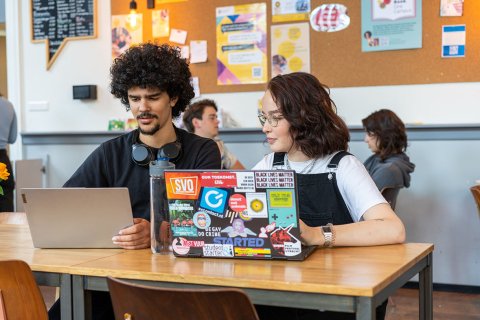Study programme
The research Master's programme Art History comprises two years (120 EC). Each year is divided into two semesters, running from September until January and from February until June. A semester is divided into two study periods.
Curriculum
The first year’s programme consists of compulsory courses and electives. The second year comprises two elements: the Master's thesis (compulsory), and the internship (or a study abroad). The first year comprises varied courses and seminars. The second year consists of an internship and the Master’s thesis. Please check the study schedule (PDF).
Year 1 | Core programme and electives
Period 1
Trends and shifts: Current research in art history and its institutions
'Trends and shifts: Current research in art history and its institutions' looks at current developments in theory, methodology and historiography such as transcultural history, post-colonial theory, gender questions, material culture and the ways this affects both art history and curatorial, collection and preservation practices in art institutions and museums.
Artful Algorithms: Digital approaches to the study of art and culture
'Artful Algorithms: Digital Approaches to the Study of Art and Culture' explores how innovations in computer science open new vistas onto the art historical past. Approaches include image vision techniques, 3D capture and modelling, and immersive ways of displaying and engaging with visual and material culture.
Curating the art exhibition: past, present and future
'Curating the art exhibition: past, present and future' (semester course, period 1 and 2) explores historical and contemporary exhibition practices. It deals with aspects such as decolonizing, decentralizing, interactivity and participation, inclusion, transhistorical exhibitions, education and mediation… Students are brought into contact with museums and art institutions at the forefront of current art and exhibitionary practices. The course is mainly thought through excursions and contact with curators and museum conservators.
Period 2
Ecologies of Art: Ways of Making, Conserving, and Knowing
'Ecologies of Art: Ways of Making, Conserving, and Knowing' in which the general theme is art as knowledge. Some questions raised are: how do artists communicate this knowledge? what is the epistemic function of materials and techniques? Which role do objects and collections play in the production and consumption of knowledge?
You continue your 'Curating the art exhibition' course from period 1.
Period 3
Global and transcultural encounters in Art History
'Global and transcultural encounters in Art History' explores amongst others Netherlandish art from the early modern period to the present day through the lens of the new approach of “Global Art History”. In the second half of the course the time line will be extended to the global art world of the 20th-21st centuries and contemporary approaches. Some themes are: global versus local; the agency of material culture; Orientalism and the exotic; cultural appropriation and hybridity; cross-mediality.
Parallel with this course you follow a Dutch Research School of Art History course of your choice (elective).
Period 4
Designing your research: disciplinary and transdisciplinary approaches
The course 'Designing your research: disciplinary and transdisciplinary approaches' prepares you for your thesis in Year 2. You explore a topic of your choice theoretically historiographical and methodological. You will gain insight into the difference between a disciplinary and interdisciplinary approach. You explore and review existing research.
An elective from Art History or from another programme or University
You take an elective from Art History or from another programme or University. Art History offers several Research tutorials for you to choose from: Research tutorial Art History: Period focus; Research Tutorial Curating Art and Heritage; Research Tutorial Global and Transcultural Art Practices; Research Tutorial Digital, Material and Technical Art History.
Another elective Art History course is 'Meet the creators and makers: art, studio and related practices' from the Renaissance to Contemporary art. In this elective course students learn about historical and contemporary studio practices, visit artists studio’s turned into research centers or museums, learn how you can interview artists about their ways of working, material use, use of concepts and artistic ideas.
Parallel with this course you take your second Research School Art History elective.
Year 2 | Internship and thesis
In your second year you have the change to follow an almost 6 month long internship at a museum or an art, heritage, research institution of your choice. You can do this in the first or second semester. In the other semester you will write you thesis. We organise thesis labs and research events that will help you. Students can exchange the internship for a study abroad.

Educational methods
- seminars (40%)
- self-study (35%)
- internship (25%)
In general, interaction within the community of the programme’s students is stimulated. Moreover, all RMA students are invited to staff meetings, during which individual members present and discuss their research.
Internship
In choosing your internship, you will be able to benefit from the long-standing links that the RMA programme has established with all major Dutch museums and with many important institutions abroad. In the past five years, the Art History staff members contributed to over 20 exhibitions. Students returning from their internships will communicate their experiences to their peers from the first-year.
Examinations
- papers
- oral presentations
- written internship report
- Master's thesis
Extra opportunities
Are you looking for an extra challenge?
For students looking for an extra challenge in addition to their Master's, there are several options. Utrecht University offers several honours programmes for students looking for an extra challenge. Honours education is followed on top of your regular Master's programme and goes beyond the regular curriculum. Honours programmes are available at interdisciplinary level and allow you to work on projects that transcend your own discipline.

